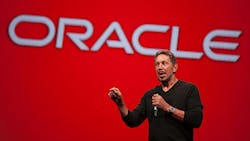Ellison's Musk Moment Puts NetSuite in Big Tech's Arms
Larry Ellison finally got his man: Larry Ellison.
Oracle said Thursday it struck a deal to buy financial-software firm NetSuite in the second self-dealing acquisition of the summer. First we had Elon Musk’s Tesla trying to buy SolarCity, another company in which Musk owns a minority position. Oracle is essentially in the grasp of Ellison, the founder who holds a 27% stake in the company. Ellison also owns 40% of NetSuite’s stock.
For the acquisition to go through, a majority of shareholders not named Ellison or affiliated with NetSuite’s bosses have to vote in favor of the purchase. That offers a modicum of protection for NetSuite shareholders, who might understandably worry that they’re not getting a fair price when Ellison is buying a company from Ellison.
Unlike the attempted Tesla-SolarCity combination, a deal between Oracle and NetSuite actually makes strategic sense. People in the tech industry have forever believed Oracle would eventually buy NetSuite. The speculation has heated up recently as Oracle has pushed further into NetSuite’s territory of software that runs companies’ essential financial activities, ranging from managing inventory and paying suppliers to keeping the accounting books.
The question is, Why is Oracle making its play for NetSuite now? The trigger may have been that NetSuite became just cheap enough, sort of, to check the box for financial soundness. In this still-heated M&A environment, the math only needs to vaguely work, and it’s transcended by an urgency to buy growth. Like many software stocks, NetSuite hit a peak in 2014 and approached that level again in 2015, then sold off early this year. In February, the company was valued at a mere 5.6 times revenue, its lowest multiple since mid-2010.
Oracle also may have capitalized on a moment of leverage over a long-sought-after acquisition target. It’s not a 50% stock drop that makes boards consider a sale, but the scare followed by a share recovery that makes a takeover premium start to look palatable. At $109 a share, Oracle is paying 38% more than NetSuite’s average closing price in the 20 trading sessions through Wednesday.
Make no mistake, though: Ellison didn’t sell NetSuite to himself on the cheap. For one, NetSuite is nowhere near profitable. (Although adding back non-cash expenses such as stock-based compensation reveals a cash-flow-positive company.) Yes, Oracle co-CEO Safra Catz said the acquisition will be “immediately accretive to Oracle’s earnings,” but that’s on a — wait for it — “non-GAAP basis.” Hopefully, this isn’t the start of a trend where companies claim non-GAAP merger accretion is a thing.
Looking at the deal on a revenue basis, it ranks among the most expensive software takeovers of the past few years, with a whopping multiple of 11. But even at that rich valuation, NetSuite — like Microsoft’s deal for LinkedIn and Salesforce’s purchase of Demandware — is agreeing to sell for less than its peak share price of $120.
It’s growing increasingly clear from the run of technology takeovers of late that we’re reaching the end of viability for many independent business software companies. We’re in a period where tech companies that try to do one thing and do it well — systems for digital-file storage, financial technology like NetSuite’s, software for the utility industry — are on the wrong ends of technology buyers’ preference for one-stop technology operations like Microsoft, Oracle and Cisco. Those titans can sell a company nearly everything it needs, including computer software, telephone systems, technology to manage the books and systems to manage deliveries to retailers.
Just look at the capitulation of independent software firms in the last few months that made the tech superpowers even more formidable. Microsoft bought LinkedIn to broaden the appeal of Microsoft Office to businesses. Salesforce purchased e-commerce specialist Demandware to spread itself into a fertile area of business technology. Oracle bought two industry software specialists in Textura and oPower that likewise may have rethought whether they could continue on their own. In technology, the big are getting bigger, and the little guy may have no choice but to surrender or risk losing out.
By Shira Ovide and Tara Lachapelle
